The Book of Genesis in the Bible tells the story of the Tower of Babel. In defiance of God’s command to “fill the earth,” humans began building tall towers across the land, challenging divine authority. Angered by their actions, God made their languages different, preventing them from communicating. As a result, they could no longer cooperate to build the towers and were scattered across the world. This story highlights the profound impact of language differences on human communication.
However, with the rise of artificial intelligence, particularly large language models (LLMs) like ChatGPT and DeepL, multilingual communication and translation have become significantly easier. The latest AI models can now translate documents spanning dozens of pages in just seconds.
But does this mean all translation challenges have been solved? Not necessarily. While AI-generated translations may be sufficient for general communication, even if they are not perfectly accurate or if some nuances are lost, certain fields require absolute precision. Legal interpretation, corporate contracts, and patents are examples where even minor translation errors can lead to serious disputes.
This is where BeringLab comes in. BeringLab is a company that develops and provides AI-powered translation engines for specialized fields such as law, patents, and clinical research.
Legal translation is particularly challenging due to technical terminology that often contradicts intuition. A good example from Korean law is the term “피상속인” (pi-sangsok-in). The prefix “피(被)” generally implies a passive role, making it seem as if the term refers to an heir receiving an inheritance. However, in reality, “피상속인” refers to the deceased person who bequeaths the inheritance, while the heir (“상속인”) is the one who receives it. These legal terms are codified within each country’s legal system, and failing to understand their precise meanings can lead to critical translation errors. This is where BeringLab’s expertise gives it a competitive edge.
Although BeringLab was officially founded in 2020, its origins trace back to 2012. One of its co-CEOs, Moon Seong-hyun, is a lawyer who has been translating legal documents since 2012. The other co-CEO, Kim Jae-yoon, comes from a finance background and has worked abroad, specializing in financial translations. Over the years, they gained significant experience in professional translation. However, as AI-powered tools like Google Translate improved, they recognized a new opportunity and decided to establish BeringLab.
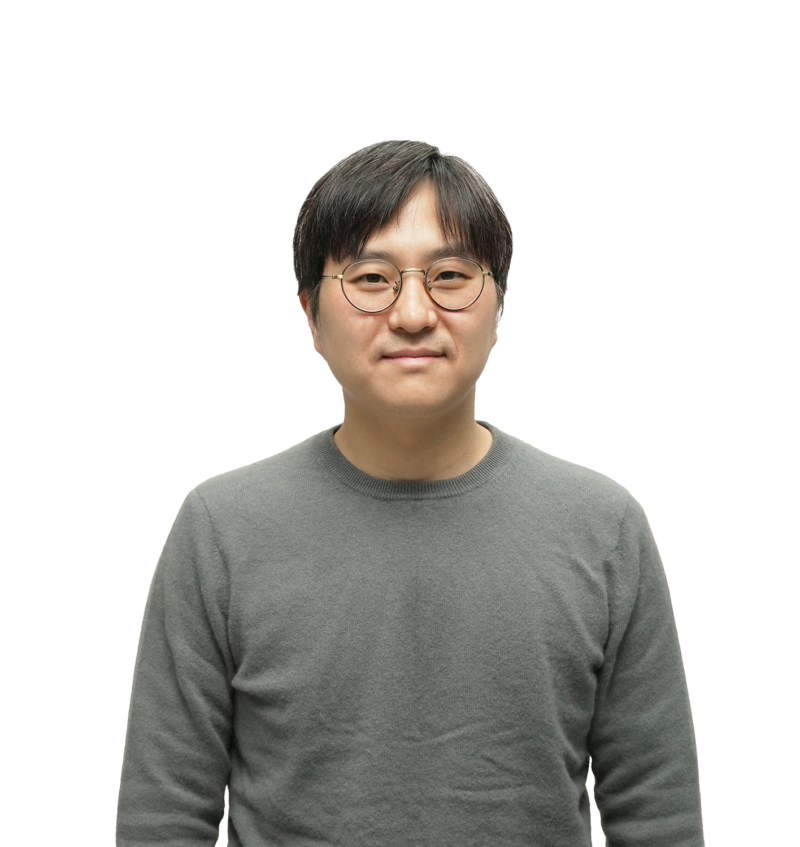
What makes BeringLab competitive? According to Kim Jae-yoon, “Training AI requires an enormous amount of high-quality data. We have been accumulating specialized legal translation data since 2012, and that data has become the core strength of BeringLab’s AI engine.” Even before AI came into play, BeringLab’s human translators were already excelling in the industry. The vast database they built over the years has now become an invaluable asset in the AI era.
The market outlook is highly promising. According to Kim, the global translation industry is valued at approximately $75 billion (100 trillion KRW), with legal translation accounting for about 10%, or $7.5 billion (10 trillion KRW). As international trade, exports, and business agreements increase, companies and institutions require precise legal translations. Such work demands experts fluent in at least two languages and knowledgeable in the legal systems of at least two countries, making it an expensive service. BeringLab aims to streamline this process with its AI-powered solutions.
One of BeringLab’s greatest challenges—and strengths—is its inherently global nature. The world operates with dozens of languages, and as international transactions grow, BeringLab’s market naturally expands. Recognizing this, BeringLab expanded its AI’s supported languages to 30 in 2024. Additionally, instead of relying solely on AI-generated translations, BeringLab has a rigorous human review process, where a network of 600 experts worldwide verifies the accuracy of AI-generated documents before final delivery. This strategy maximizes efficiency while ensuring precision, solidifying BeringLab’s position in the market.
Since last year, BeringLab has been actively attracting overseas clients. In 2024, the company projected revenue of $2.25 million (3 billion KRW), with 20% of that coming from international clients. To further expand overseas sales, co-CEO Kim Jae-yoon has spent half of the year abroad, engaging with multinational corporations. The company has set a 2025 revenue goal of $6.75 million (9 billion KRW) and plans to expand into key markets such as Singapore, Hong Kong, and the United States.
Since its founding, BeringLab has secured two rounds of investment from major backers. In 2020, it received seed funding from Seoul Techno Holdings and Naver. In 2024, it raised $2.25 million (3 billion KRW) in a pre-Series A round from SoftBank Ventures Asia (SBVA), The MBA Fund, and other institutional investors. While BeringLab has no immediate fundraising plans, it is preparing for a Series A round in 2026 to expand into new sectors and markets.
The Gyeonggi Center for Creative Economy & Innovation (GCCEI) operated the Global Top-tier Elevator (GTE) program last year, which was a perfect fit for BeringLab, a company with global ambitions from the start. CEO Kim Jae-yoon expressed his gratitude, saying, “GCCEI has provided significant support in helping us build a global network by introducing us to major U.S. law firms, our potential clients, and enabling us to participate in the Plug and Play Summit.” The impact of GCCEI’s support is expected to become evident this year.
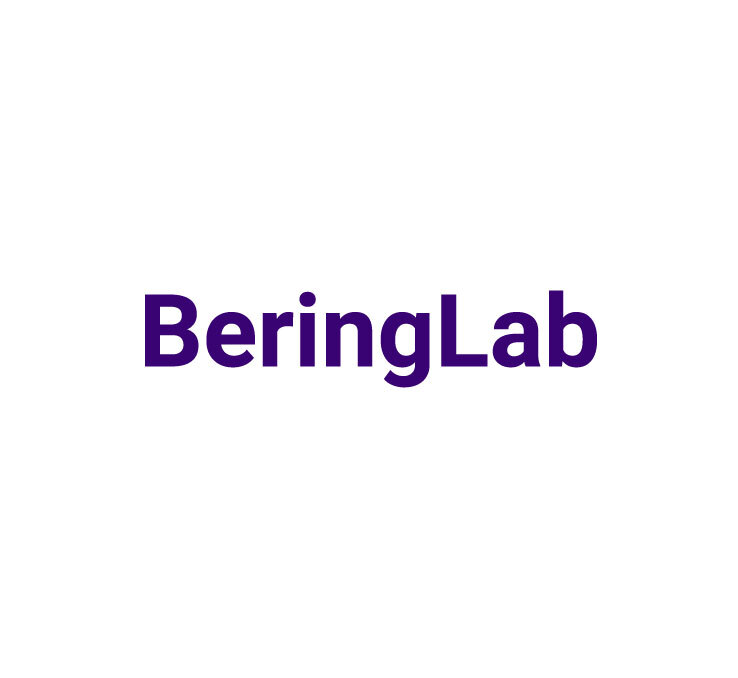
What problem are we trying to solve?
Translations are slow and expensive, especially for highly specialized fields such as legal. Outsourced human translations produce sub-par quality because 99% of agencies don’t use lawyers as translators. General domain machine translation tools like Google Translate do not work well for legal documents. Lawyers are stuck with either having to do the translations themselves, which takes time away from real client work, or outsourcing to agencies and dealing with the quality issues.
How do we solve this problem?
We are developing AI-powered translation engines and tools specifically designed for the legal, intellectual property (IP), and life science industries. Our models are trained on highly specialized, domain-specific data, much of which is proprietary, enabling them to yield more targeted results compared to general domain engines. In addition to our AI translation platform, we also offer expert review services for cases where finalized or certified translations are required.
What are our competitive advantages and technical strengths compared to competitors?
Our domain-specific translation models are 2x more accurate than Google Translate for contracts and patents. These models can also be fine-tuned on client data for a more bespoke solution. We also offer enhanced data security, including private cloud and on-premise solutions, especially for law firms and major corporations that are highly sensitive to data privacy. Final translations with expert review can be turned around 3x faster and 40% cheaper, with expert-reviewed accuracy, compared to traditional translation agencies.
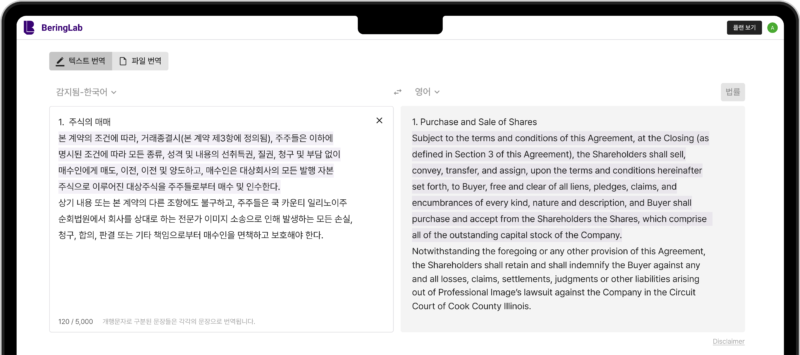
What products do we offer, and what is their current status?
We offer both monthly subscription plans for our AI translator platform, as well as post-editing services by expert professionals for certified translations. We also support API integrations as well as integrations with various workflow and productivity tools like Microsoft Word. We’ve recently expanded support for 30 languages, and work with a pool of 600+ experts to provide our expert review services. We are also collaborating with large design partners to develop custom translation models, speech recognition applications, and tailored tools and integrations.
What is the size of our target market, and who are our key customers?
Translation is a $65B market globally. Of this, legal translation accounts for about 10%, or $6.5B. We believe the actual translation demand, including cases where lawyers handle the translations themselves, is roughly double this amount, making the opportunity over $10B. However, we also see an even larger opportunity beyond this—specifically for internal company reports, documents, and presentations, as well as in the legal context for due diligence and e-discovery. These areas have a massive need for specialized translations at scale, which is not being met by current solutions: human translation (too slow and expensive) or machine translation (not accurate enough).
What is our business model?
We offer our AI translation platform as both a web-based subscription plan starting at $10 per month, and an enterprise solution with annual contracts. The expert review service is charged on volume, at around $30 per page. We are a B2B service targeting law firms, patent firms, and corporations.
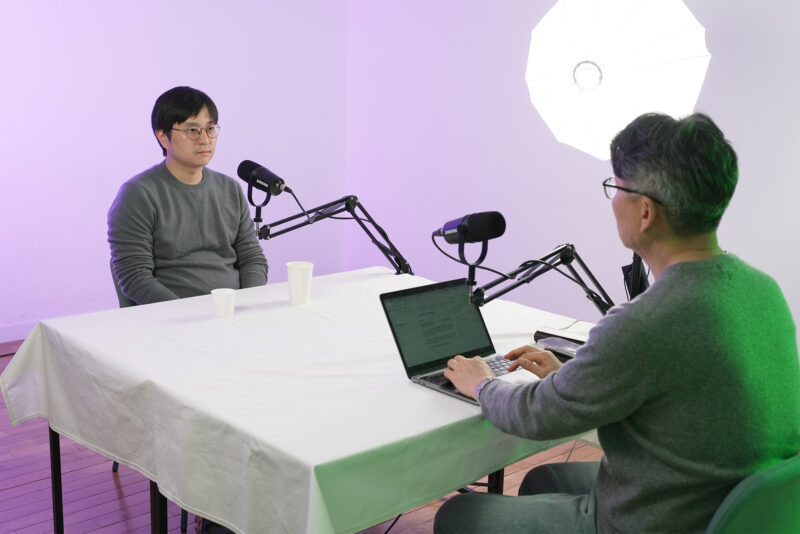
What achievements has our team made so far?
We currently serve over 200 clients, including major law firms like Baker & McKenzie and Shin & Kim, patent firms, and multinational corporations like Microsoft and Capgemini. Last July, we raised a KRW 3B pre-series A round from SBVA (formerly SoftBank Ventures) and The MBA Fund.
What is our team’s competitive advantage?
The co-founders previously founded and scaled the largest legal translation company in Korea. The team started developing their AI models in 2018, leveraging the data collected and experience gained from running a translation agency, and commercialized the AI service in 2022. With over 10 years of experience, we have developed a deep understanding of the industry, and a broad network of existing clients. In addition, our tech team won first place at several international machine translation competitions, including WMT20 and WAT2021.
What efforts are we making for international expansion, and what results have we achieved?
We began our global expansion efforts last year by expanding support for new languages. Since then, we’ve made in-person trips to Singapore, Hong Kong, New York, and London to meet with customers and gain in-depth insights into their needs. We started building trust through smaller projects, which gradually increased. Overseas clients now make up nearly 20% of our total revenue. To meet the data privacy requirements of global firms, we are in the process of obtaining SOC2 and ISO27001 certifications, which are expected to be completed by Q1 2025. Additionally, we are expanding our pipeline through new POCs signed with major global law firms and patent firms. Finally, we’ve recently hired a Hong Kong country manager to accelerate expansion in the region.
How does the GTE program facilitate your expansion into international markets?
The Gyeonggi Center for Creative Economy & Innovation’s ‘Global Top-tier Elevator (GTE) program’ provided us with tailored support for our global expansion efforts. Through the center’s network, we were able to connect with major international law firms, our potential clients, and hold meetings that have led to ongoing collaboration discussions.
Additionally, with the center’s support, we had the opportunity to attend the ‘Plug and Play Summit in Silicon Valley’, where we gained firsthand insights into the global startup ecosystem and the latest AI technology trends. At the event, we engaged in networking with open innovation managers from multinational corporations, which led to follow-up business meetings and potential partnerships.
GCCEI has demonstrated particular strength in providing customized mentoring and global network connections for technology startups like BeringLab seeking international expansion. Their practical and strategic support has been instrumental in helping us scale our business globally and establish a strong presence in international markets.
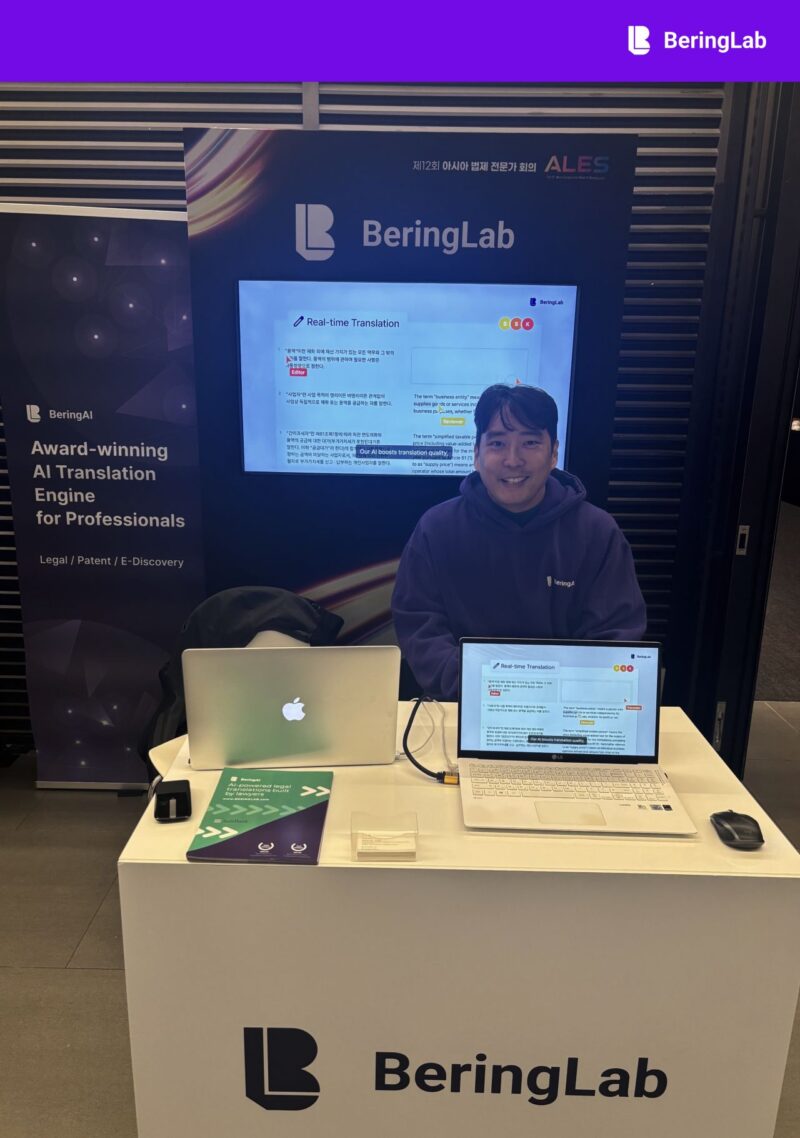
Three reasons why we need investment
First, we’re the ideal team to disrupt the antiquated translation industry. Our team combines years of industry experience, domain expertise, and technical capabilities proven in international competitions.
Second, we are already generating 30B KRW in revenue with 200 clients secured, and we expect to triple our revenue this year.
Third, we have a business model perfectly suited for international expansion, along with the right team to execute a global strategy.
MORE FROM THE POST
- [Korean Startup Interview] Deepvisions: Revolutionizing Air Pollution Monitoring with AI-Powered Vision Technology
- [Korean Startup Interview] From Text to CAD: How Herewe’s EaseAI Is Revolutionizing Product Design
- [Korean Startup Interview] IPIN LABS, “Challenging the Global Market with Strong Indoor Positioning Technology”
- [Korean Startup Interview]MAZE: “Developing Vision AI to Remember Human Personas, Aiming to Lead Global Offline CRM”
- [Korean Startup Interview] Ubeeslab: “Performance Analysis for Athletes with SOCCERBEE.. Rapid Growth in the Global Market”
- AI
- BeringLab
- EN
- Interview
- Korea
- Korean startup
- Korean startup interview
- legal translation
- Startup Together
- wow together
- WOWTALK
Share
Most Read
- 1
- 2
- 3
- 4
- 5




Leave a Reply